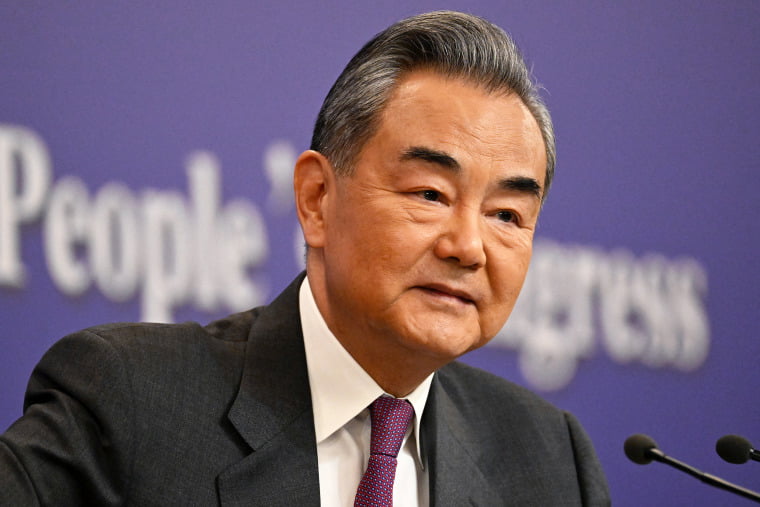Although relations between the United States and China have improved since their leaders met in November, according to Foreign Minister Wang Yi, the United States has not lived up to its commitments.
In Short
- Foreign minister wang yi highlights concerns over potential strains in u.s.
- China relations due to perceived u.s. actions.
- Despite recent improvements, wang expresses apprehensions regarding the u.s.’s approach to china, citing hindrances to china’s development.
- Tensions over taiwan’s status and territorial disputes in the south china sea add complexity to the diplomatic landscape.
TFD – Delve into the complexities of U.S.-China relations as Foreign Minister Wang Yi issues a stern warning. Despite recent improvements, Wang expresses concerns about the U.S. being ‘obsessed’ with restraining China, potentially jeopardizing diplomatic ties.

Beijing: China’s foreign minister warned on Thursday that efforts to improve ties between the two largest economies in the world may be in jeopardy because the US was “obsessed” with repressing China.
Amid disagreements over technology, trade, human rights, Taiwan’s status, an alleged Chinese spy balloon shot down over the United States, and Beijing’s stance on hostilities in Ukraine and the Middle East, relations reached their lowest point in decades last year.
Following their first meeting in a year, which took place in November in California, Presidents Xi Jinping and Joe Biden said that there had been “some improvements” in U.S.-China relations. Foreign Minister Wang Yi said as much. However, Wang noted that despite the unilateral sanctions against Chinese tech and other industries “reaching bewildering levels of unfathomable absurdity,” the U.S. continues to harbor misconceptions about China and is working to impede its development.
He asked, “Where is the credibility of the United States as a major country if it says one thing and does another?” during a broad news conference in Beijing on the eve of the country’s rubber-stamp legislature’s annual meeting. “If it becomes nervous at the mention of the word China, what confidence does it have as a major power?”
Wang went on, saying, “The problems the United States faces are internal, not external to China,” pointing out that this year marks the 45th anniversary of the formal opening of diplomatic ties between the two countries. “The United States will eventually hurt itself if it is obsessed with suppressing China.”
After his successor, Qin Gang, was abruptly dismissed from office approximately six months into the position, Wang, 70, a former foreign minister and China’s top diplomat, took up the position again last year. Since last June, Qin has not been spotted in public.
Though it now seems doubtful, the National People’s Congress meeting this week in Beijing was once thought to present a chance to name a new foreign minister.
Wang declared that the “long-standing occupation of Palestinian territories cannot be ignored” and demanded an immediate cease-fire, the release of all prisoners, and the provision of humanitarian help in the Israel-Hamas conflict.
“The Israel-Palestine conflict is a vicious cycle that can only be broken by providing justice to the Palestinian people and fully implementing a two-state solution,” he declared.
Wang also talked about the tensions in the South China Sea, a vital shipping route that Beijing claims almost entirely and which has given rise to territorial conflicts with Vietnam, the Philippines, and other Southeast Asian countries.
A resupply mission for soldiers stationed at the Second Thomas Shoal, a submerged reef claimed by China, the Philippines, and other parties, was allegedly blocked this week, according to Philippine officials, by Chinese ships. A Chinese ship was seen deploying water cannons against the supply boat in video released by the Philippine Coast Guard, smashing the windshield.
China’s actions were “professional, restrained, justified, and lawful,” according to a spokesman for the Chinese Foreign Ministry, who also stated that China had been breached by the Philippines in terms of territorial sovereignty.
Wang declared on Thursday that “we will respond with prompt and legitimate countermeasures in the face of unwarranted provocation.”
Wang stated that the January elections in Taiwan, an autonomous democracy that Beijing claims as its own, “are just local elections in one part of China.”
“The outcome does not alter the fundamental reality that Taiwan is a part of China in the slightest,” he declared.
Taiwan asserts that its 23 million citizens alone have the authority to determine its future, rejecting Beijing’s claims of sovereignty. Although Beijing views Vice President Lai Ching-te, the election’s victor, as a separatist and “troublemaker,” she supports preserving the status quo.
Wang stated that although Beijing’s stance is “quite clear: We will never allow Taiwan to be separated from the Chinese motherland,” Beijing will still pursue “peaceful reunification” with Taiwan.
Conclusion
As tensions persist, Wang’s message underscores the delicate balance in U.S.-China relations. It calls for mutual understanding and constructive engagement to navigate the complexities and foster cooperation for global stability. Let’s reflect on the significance of maintaining dialogue amidst diplomatic challenges.
Connect with us for the Latest, Current, and Breaking News news updates and videos from thefoxdaily.com. The most recent news in the United States, around the world , in business, opinion, technology, politics, and sports, follow Thefoxdaily on X, Facebook, and Instagram .